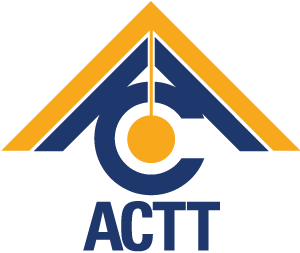FAQ on Accreditation
Introduction
The Accreditation Council of Trinidad and Tobago (ACTT) is a statutory body established by the Accreditation Council of Trinidad and Tobago Act, Chapter 39:06 (“the Act”). The Act provides the legal framework for the development and implementation of a quality assurance system for post secondary and tertiary education in Trinidad and Tobago. In Trinidad and Tobago, ACTT is the principal body responsible for conducting accreditation-related activities at post secondary and tertiary educational institutions.
What is Accreditation?
Accreditation is both a status and a process. As a status, it is bestowed upon an institution that has met educational quality standards set by a bona-fide accrediting agency or quality assurance body.
As a process, it is the steps that an institution undergoes to attain the status.
It is a voluntary process through which ACTT appoints External Evaluators to review registered post secondary and tertiary institutions in order to:
- assure academic quality
- improve accountability
- support continual institutional development
Are there different types of Accreditation?
There are two types of accreditation. Institutional Accreditation involves the evaluation of the institution as a whole against internationally comparable criteria and standards to demonstrate that it surpasses the minimum requirements for offering post secondary and tertiary education.
Specialised Programme Accreditation involves the evaluation of individual specialised programmes in collaboration with specialised accrediting and regulatory bodies. These programmes are usually in specialised fields requiring a licence to operate such as Engineering, Nursing, Dentistry, Law and Education.
What is the purpose of Accreditation?
- To evaluate and assure the quality of educational offerings
- To foster public confidence in educational institutions
Which institution should apply for Accreditation?
In Trinidad and Tobago, an institution applying for accreditation must meet the following criteria:
- It is advised that the institution must have registered status with ACTT that is valid for at least twenty four (24) months from the date of application for accreditation
- At least one locally-developed degree programme approved by ACTT must be offered
- The institution must have graduated at least one cohort from an ACTT-approved locally-developed degree programme
What is examined when an institution undergoes Accreditation?
An institution undergoing Institutional Accreditation is evaluated under the following categories:
- Mission and Purpose
- Governance and Administration
- Teaching and Learning
- Preparedness for Change
- Commitment to Continuous Improvement
What steps must an institution undergo in pursuing Institutional Accreditation?
Step 1. Submit a Letter of Intent to ACTT
Step 2. Attend a Pre-Candidacy Meeting with ACTT
Step 3. Submit a completed application form and pay an Application Processing Fee
Step 4. Produce a Self-Study Report
Step 5. Submit its Self-Study Report and pay an Evaluation Fee
Step 6. Submit itself to a Comprehensive Site Visit
Step 7. Pay a Certification Fee and receive a Certificate of Institutional Accreditation bearing ACTT’s seal if conferred accredited status.
What is the duration of accredited status?
- Institutional Accreditation is for a maximum period of seven (7) years.
Can an institution lose its accredited status?
An institution can lose its accredited status if it does not comply with the General Conditions of Institutional Accreditation for Post Secondary and Tertiary Education agreement. These include but are not limited to:
- Making substantive changes without ACTT’s approval
- Misleading advertising of programmes
- Failing to submit required reports
- Non-payment of stipulated fees
The Benefits of Accreditation
To Students:
- Access to programmes and scholarships is more readily facilitated
- Transfer of students and credits between institutions is made easier
- Quality of graduates is enhanced as a result of quality assured programmes
- Graduates from accredited institutions are the preferred candidates for jobs
To Institutions:
- Improved student achievement through adoption of the quality assurance process
- Increased opportunities for institutions to develop collaborative relationships with others locally, regionally and internationally and share best practice
- Enhanced credibility and recognition locally, regionally and internationally
- Recruitment of well-qualified faculty
To Employers:
- Assurance that qualifications of potential employees are comparable regionally and internationally
- Knowledge, skills and attitudes taught are relevant to the needs of employers
To Country
- Graduates are equipped to fulfil the vision of social, industrial and economic advancement for the country
- A greater number of individuals engaged in education and training to qualify for employment
- A more knowledgeable and skilled workforce to foster increased productivity and efficiency
Can all claims of Accreditation be trusted?
Caution is advised when exploring higher education opportunities. Schools have been known to create "fake" accrediting agencies known as "accreditation mills" to accredit their institutions, programmes and awards.
These accreditation mills sometimes carry names similar to bona-fide agencies and may have well-developed websites. If your institution is accredited by ACTT or one of the recognised agencies in the region or internationally, your degree will be considered legitimate. However, if your institution is accredited by an accreditation mill, your degree will not be accepted by another institution or prospective employers.
ACTT’s Compendium
For information on whether local institutions and programmes are legitimately accredited, you may refer to ACTT’s Compendium of Registered, Accredited and Recognised Institutions, Awarding Bodies and Programmes, which may be found on the ACTT website: Compendium




 Translate
Translate